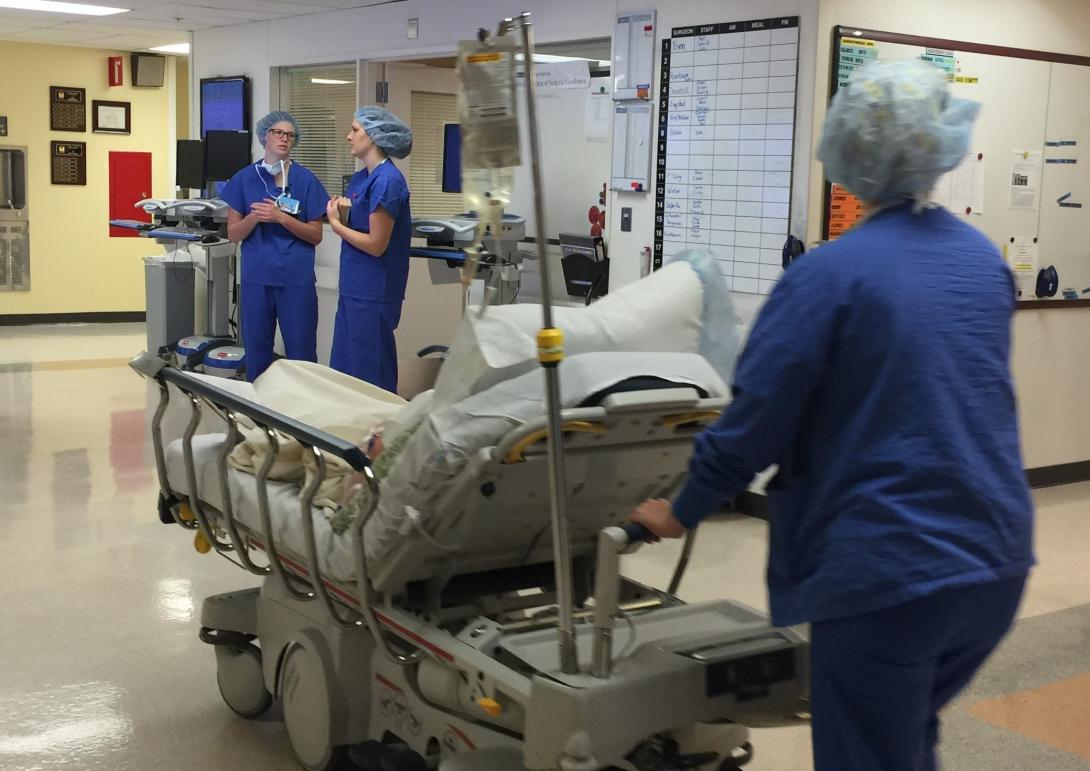
A group of Republican legislators are pushing a bill that would enter Oregon into the Nurse Licensure Compact, a multi-state agreement allowing nurses to practice outside their home states.
The Oregon House Health and Behavioral Health Committee on Monday held a hearing on House Bill 2048, which would make Oregon the 40th state or U.S. territory to join the compact. The bill’s proponents, which included hospitals, argued the bill will ease the state’s ongoing nursing shortage. But the nurses union and others pushed back, saying it would weaken oversight and leave the underlying workplace problems causing the shortage unsolved.
Established in 1999, the Nurse Licensure Compact allows licensed registered nurses, as well as practical and vocational nurses to leave home and practice in participating states without having to renew their licenses. Interest in the compact grew in Oregon during the pandemic as hospitals and other health care providers struggled to find workers, many of whom left jobs to find less stressful conditions.
Despite the high demand for nurses, Oregon’s training programs are struggling to keep up. Oregon produced the third-lowest number of nursing graduates per capita in the country. Oregon lawmakers are considering bi-partisan measures intended to expand the training pipeline. But some lawmakers say that in the meantime Oregon would benefit from out-of-state nurses.
Upon joining the compact, “it will be easier for us to rapidly onboard nurses and assure quality critical health care in times of crisis,” state Rep. Ed Diehl, a Scio Republican and chief sponsor of the bill, told the committee. “And as we hear in virtually every committee hearing, Oregon is a beautiful state with many benefits. Making it easier to practice here will attract more nurses to our state.”
Diehl, who sits on the board of Santiam Hospital in Stayton, pointed to how 90% of 85,000 licensed registered nurses or licensed practical nurses surveyed by the Oregon State Board of Nursing last year supported joining the compact.
The shortage of nurses and other health care workers became so pronounced during the pandemic that the state and hospitals began hiring firms to provide “traveler nurses.”
But Sherri Steele, chief nursing officer at Santiam Hospital and Clinics, told the committee that red tape in Oregon’s licensing process prevented her hospital from getting needed traveler nurses sooner.
She said that if Oregon joins the compact, nurses would still have to graduate from a board-approved program, pass the nurse licensure exam and pass background checks.
The legislation currently only has Republican sponsors, which could mean a heavy lift in the Democratic-dominated Legislature. It’s also opposed by the Oregon Nurses Association, a politically active union that represents 15,000 nurses and health care workers.
Tamie Cline, the union’s president, told the committee that the compact carries “significant risks” and is not “a viable tool to our workforce challenges.”
“Joining the compact would jeopardize Oregon's role to ensure that our entire nursing workforce is ethical and competent,” she said.
Cline pointed to how the Colorado Department of Human Services in January opened an investigation into a situation where someone was allegedly working as a nurse under the compact but didn’t have a valid license. She noted the FBI investigated a scheme where thousands of people allegedly paid for nursing diplomas without taking courses. About a dozen of those people made it into Oregon, she said, citing the state Board of Nursing.
Nicole Livanos — director of state affairs at the National Council of State Boards of Nursing, which oversees the compact— told the committee the alleged Florida scheme was “very sophisticated.” She added that state nursing boards coordinate to prevent fraud, and in Colorado authorities could immediately revoke someone’s ability to practice no matter where they were licensed.
But Cline said nurse training requirements differ by state. She said during the pandemic she worked with traveler nurses who didn’t know how to hang an IV bag or give a patient a shot.
The nurses union is pushing for legislation that would establish stricter staffing requirements for hospitals, which it says will prevent nurses from leaving the profession.
Paige Spence, director of government relations for the Oregon Nurses Association, questioned whether bringing in out-of-state nurses would solve the shortage. She cited numbers from the Oregon Board of Nursing from September 2022 showing there were more than 80,000 registered nurses, up from about 69,000 in February 2021 and higher still from the 63,000 in January 2019.
“So if there are more nurses licensed in the state than there were three years ago, how is there a sudden shortage of nurses?” said Spence. She added, “Oregon doesn't have a numbers problem, we have a retention problem.”
You can reach Jake at [email protected] or via Twitter @jakethomas2009.